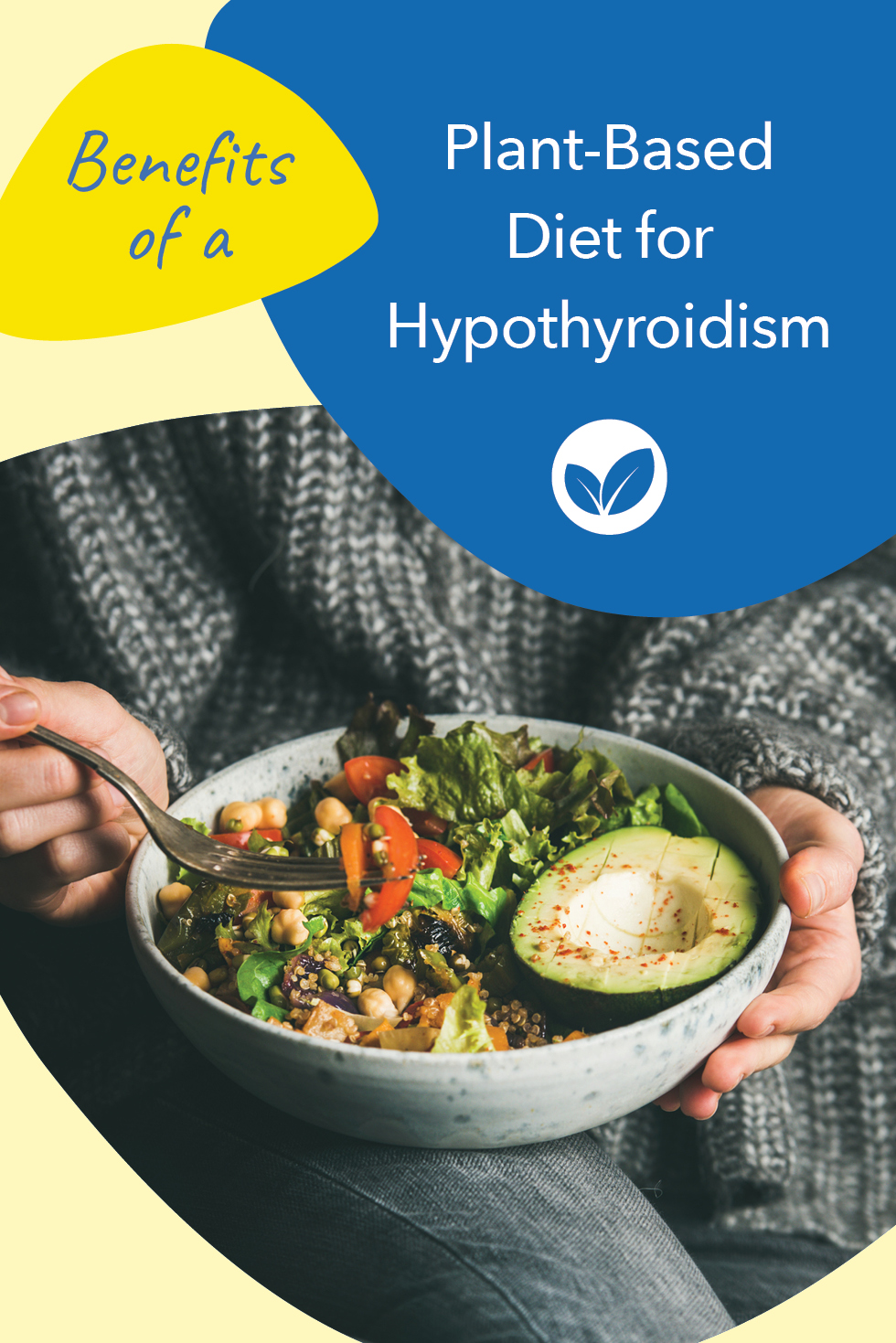Expert Advice

Acella Pharmaceuticals is partnering with Nicole German Morgan, RDN, LD, CLT to bring greater awareness to the importance of thyroid care and education. This post is sponsored by Acella Pharmaceuticals.
Disclaimer: The information provided is for educational purposes only and does not substitute professional medical advice. Consult a medical professional or healthcare provider before beginning any exercise, fitness, diet, or nutrition routine. Acella Pharmaceuticals does not endorse, promote or sponsor any products or brands mentioned in this article. The views expressed here are those of the author.
Many people who have hypothyroidism wonder if they can eat a plant-based diet. Does eating a lot of plants interfere with thyroid function? Do those of us with hypothyroidism need to add more meat to our diets? I am here to reassure you that a diet plentiful in plants will support your health even if you have hypothyroidism.
What is a Plant Based Diet?
The term “plant-based diet” simply means that the majority of what you eat comes from plants. A plant-based diet is not necessarily a vegetarian or vegan diet. When you eat plant-based, you may include animal sources, but sparingly. For example, you may add in one to two eggs for breakfast occasionally, or include your meat serving as a side dish to your main entrée of plants.
Non-plant foods are anything that comes from an animal and include meats, seafood, dairy and eggs. Some people who follow a plant-based diet try to avoid or limit honey, which comes from bees. All other foods including grains, vegetables, fruits and legumes come from plants.
Does Eating a Lot of Plants Affect the Thyroid?
There are a few plant foods that may lower thyroid hormone, as they contain natural plant chemicals called goitrogens. Some research suggests these chemicals may reduce thyroid hormone when consumed in excess. Goitrogens are found in cruciferous vegetables such as broccoli, kale, cabbage, cauliflower and Brussels sprouts. Another plant food that may contribute to thyroid toxicity is soy.¹
Although there is some evidence that these foods may lower thyroid hormone, there is not enough conclusive evidence to suggest that you should avoid these healthy vegetables.2,3 The research is simply lacking.
In addition, cruciferous vegetables such as broccoli and kale provide so many positive health benefits that it may be more of a negative to avoid them! For example, a cup of cooked broccoli is an excellent source of vitamin C and folate, which may play a role in cancer prevention. ⁴
Another group of plants that people with hypothyroidism are often concerned about is the nightshade category. Nightshade vegetables have the plant chemical solanine and include tomatoes, potatoes, eggplant and bell peppers. There is no evidence that you should remove nightshades from your diet if you have hypothyroidism. However, there is some limited evidence of a link between nightshades and possible joint inflammation or aches and pains in susceptible individuals. This research is not conclusive. ⁵
Benefits of Increasing Plant Foods in Your Diet
Fruits and vegetables are one of our richest sources of vitamins, minerals and antioxidants. In addition, many of these antioxidants and nutrients help support a healthy inflammatory response in our bodies. Animal products contain far fewer antioxidants.
An overwhelming amount of research indicates that we should work to include five to nine servings of fruits and vegetables in our daily diets to support optimal health. Not only does this goal support total body health, but it is also ideal for thyroid health. If we are working to support thyroid health, it is wise to increase foods that support this healthy inflammation response and further protect our bodies against external and internal stressors.
Thyroid hormones thrive when we nourish our bodies with plenty of supportive nutrients. The best way to get these nutrients is by eating foods that provide not only vitamins and minerals, but multiple sources of antioxidants.

REFERENCES: 1. Doerge Daniel R, and Sheehan Daniel M. 2002. “Goitrogenic and Estrogenic Activity of Soy Isoflavones.” Environmental Health Perspectives 110 (suppl 3): 349–53. https://doi.org/10.1289/ehp.02110s3349. 2. Gaitan, Eduardo. 1990. “Goitrogens in Food and Water.” Annual Review of Nutrition 10 (1): 21–37. https://doi.org/10.1146/annurev.nu.10.070190.000321. 3. Chu, Michael, and Terry F. Seltzer. 2010. “Myxedema Coma Induced by Ingestion of Raw Bok Choy.” New England Journal of Medicine 362 (20): 1945–46. https://doi.org/10.1056/NEJMc0911005. 4. Ambrosone, C. B., and L. Tang. 2009. “Cruciferous Vegetable Intake and Cancer Prevention: Role of Nutrigenetics.” Cancer Prevention Research 2 (4): 298–300. https://doi.org/10.1158/1940-6207.CAPR-09-0037. 5. “An Apparent Relation of Nightshades (Solanaceae) to Arthritis.” n.d. Accessed March 21, 2020. http://www.noarthritis.com/research.htm.
Note that DTE products, including NP Thyroid®, have not been reviewed by the FDA for safety or efficacy.
IMPORTANT RISK INFORMATION, INCLUDING BOXED WARNING & INDICATIONS
Important Risk Information
Drugs with thyroid hormone activity, alone or together with other therapeutic agents, have been used for the treatment of obesity. In euthyroid patients, doses within the range of daily hormonal requirements are ineffective for weight reduction. Larger doses may produce serious or even life-threatening manifestations of toxicity, particularly when given in association with sympathomimetic amines such as those used for their anorectic effects.
- NP Thyroid® is contraindicated in patients with uncorrected adrenal insufficiency, untreated thyrotoxicosis, and hypersensitivity to any component of the product.
- In the elderly and in patients with cardiovascular disease, NP Thyroid® should be used with greater caution than younger patients or those without cardiovascular disease.
- Use of NP Thyroid® in patients with diabetes mellitus or adrenal cortical insufficiency may worsen the intensity of their symptoms.
- The therapy of myxedema coma requires simultaneous administration of glucocorticoids.
- Concomitant use of NP Thyroid® with oral anticoagulants alters the sensitivity of oral anticoagulants. Prothrombin time should be closely monitored in thyroid-treated patients on oral anticoagulants.
- In infants, excessive doses of NP Thyroid® may produce craniosynostosis.
- Partial loss of hair may be experienced by children in the first few months of therapy but is usually transient.
- Adverse reactions associated with NP Thyroid® therapy are primarily those of hyperthyroidism due to therapeutic overdosage.
- Many drugs and some laboratory tests may alter the therapeutic response to NP Thyroid ®. In addition, thyroid hormones and thyroid status have varied effects on the pharmacokinetics and actions of other drugs. Administer at least 4 hours before or after drugs that are known to interfere with absorption. Evaluate the need for dose adjustments when regularly administering within one hour of certain foods that may affect absorption.
- NP Thyroid® should not be discontinued during pregnancy, and hypothyroidism diagnosed during pregnancy should be promptly treated.
Indications
NP Thyroid® (thyroid tablets, USP) is a prescription medicine that is used to treat a condition called hypothyroidism from any cause, except for cases of temporary hypothyroidism, which is usually associated with an inflammation of the thyroid (thyroiditis). It is meant to replace or supplement a hormone that is usually made by your thyroid gland.
NP Thyroid® is also used in the treatment and prevention of normal functioning thyroid goiters, such as thyroid nodules, Hashimoto’s thyroiditis, multinodular goiter, and in the management of thyroid cancer.
Revised
10/2023
You Are About To Leave This Website
By clicking continue, this link will take you to a website to which Alora Pharmaceuticals’ Policies & Terms of Use do not apply.
^Based on prescriptions filled, NP Thyroid® is the #1 Prescribed DTE in the United States. Source: IQVIA National Prescription Audit (NPA) data on file. Acella Pharmaceuticals, LLC.
